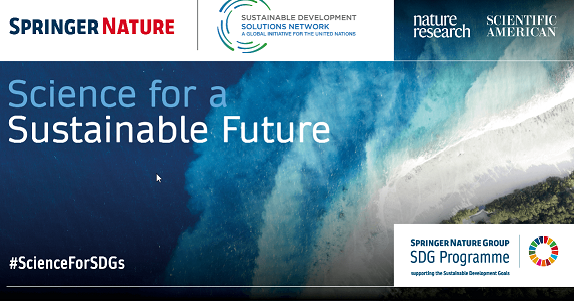Bridging the gap between science and policy
Since 2015, the countries of the United Nations have been working to address 17 of the most difficult challenges facing humanity, with the aim of achieving a more peaceful and prosperous world by 2030. This week marks - the week for action, awareness, and accountability for the Sustainable Development Goals (SDGs). Timed to coincide with the UN General Assembly - the aim of the week is to keep those goals and the work needed to do to achieve them, in the public eye. In 2020, 50¶Č»Ň is pleased to be a supporting partner once again.
Science and learning are the cornerstones of progress, and publishing plays an integral part in both. One of the aims of the 50¶Č»Ň SDG Programme is to work with external partners to encourage and facilitate the use of scholarly research in policymaking to achieve the Goals. An organisation who shares our commitment to the integration of research and policy is the
The COVID-19 pandemic has exposed the gaps in the current systems and existing mechanisms for the integration of research into policy. Scientific evidence continues to be sidelined in the global response to COVID-19 because it is not seen as crucial to developing appropriate policies. The need to bridge these gaps is more urgent than ever.
On 8th October 2020, 50¶Č»Ň and SDSN are bringing together a diverse group of experts who are well placed to consider solutions to these issues. Science for a Sustainable Future is a free online conference, featuring opening remarks from , President of SDSN and Director of the Center for Sustainable Development at Columbia University and closing remarks from , Editor-in-Chief of Nature and Senior Advisor to SDSN and Director of SDSN’s Thematic Research Network on Data and Statistics. Editor-in-Chief of Scientific American will introduce the event.
We have assembled three globally-representative thematic panels of academics, researchers, practitioners and policymakers to explore how to improve science-policy integration in the areas of:
- Food Systems and Land Use - chaired by Executive Director, SDSN
- Urbanization - chaired by , Senior Editor, Scientific American
- Health - chaired by , Senior Reporter, Nature
- The full schedule, including the list of confirmed panellists is available here: Science for a Sustainable Future.
The panels will be framed around the questions of:
- What mechanisms should we use to raise the profile of scientific opinion in international policy-making? What mechanisms could complement existing efforts, such as the UNSG’s Science Advisory Board and the IPCC?
- What is and should be the role of research institutions, universities, industry, and other scientific and expert groups in shaping national sustainable development policy? What are the most useful national and local examples?
- How can we foster the use of more and better data in national and international sustainable development policy-making?
The conference will also delve into issues raised in each of the thematic areas, looking at national and local examples of good practice and areas where connections could (and should) be improved.
The conference will run from 8am - 11am EDT / 1pm - 4pm BST / 2pm - 5pm CEST / 8pm - 11pm CST. You can find out more and sign up here: Science for a Sustainable Future.
The event will be preceded by a public call to action from Jeffrey Sachs and Magdalena Skipper, encouraging both researchers and policymakers to work more collaboratively and take notice of each others’ needs. We intend to solicit feedback on this initial statement, and the feedback and outcomes from the conference discussion will be developed into a white paper with concrete recommendations for moving forward..
Science for a Sustainable Future is set to be an essential forum for furthering the integration of scientific knowledge and evidence into national and international policy.




